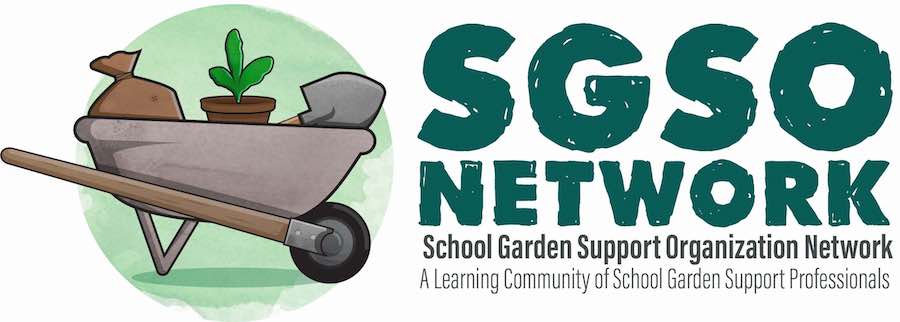Measuring ImPact & Sharing Results
Since 2016 the SGSO Leadership Institute has been collecting, reviewing, and sharing resources related to program evaluation, student assessment and sharing results. The following are resources created and curated by SGSO Leaders. Enjoy – go deep!
Resources For Measuring Impact & Sharing Results
- Key Characteristics of Great Surveys
- Culturally Responsive Evaluation
- Outcomes Framework and Sample Surveys
- How SGSOs Share Impact
A detailed viewer guide and notes on the 2020 SGSO Leadership Institute presentation on creating effective surveys. VIEW THE MAIN THEMES AND AUDIO CLIPS FROM THE PRESENTATION.
Presented at the 2021 Virtual SGSO Leadership Institute, this presentation shares an overview and resources to create Culturally Responsive Evaluation. VIEW THE RESOURCES AND PRESENTATION.
A curated collection of school garden survey examples and sample survey questions. VIEW SURVEY FRAMEWORK & QUESTION BANK.
Best practices for sharing program impact, planning tools, & loads of examples from SGSOs. VIEW THE RESOURCES.
Resources for taking a deep dive into Evaluation & Assessment
FoodCorps Healthy Schools Toolkit
FoodCorps’ Healthy School Toolkit is a set of resources designed to:
Take a snapshot of your current school food environment.
Guide your school community in creating a vision for the future.
Document your action plan for working toward that vision.
Evaluate and celebrate your school community’s history and progress over time.
The GREEN Tool: For Well-Integrated School Gardens from Teacher’s College Columbia University
Defines elements and shares case studies for creating a strong school garden culture
GREEN School Garden Integration Matrix to rank / score your program. Created by Gallatin Valley Farm to School
Cornell Garden-Based Learning Evaluation Toolkit
Easy to use guidance, aimed at the educator with minimum experience with evaluation, for purposes of program improvement and documentation.
Informal Science.org is a collection of evaluation resources designed to support informal STEM education. They share a robust collection of evaluation tools and instruments, advice for working with an evaluator, how to create an evaluation plan and more.
My Environmental Education Evaluation Resource Assistant (MEERA)
Online “evaluation consultant” created to assist you with your evaluation needs. It will point you to resources that will be helpful in evaluating your environmental education program.
National research and design effort which developed and tested a variety of survey instruments, interview and observation protocols, and other instruments for use in research efforts.
Using Evaluation to Move Your Program to the Next Level
This guide from the Tisch Center for Food, Policy, and Education walks participants through basic program evaluation methods giving them the tools to assess the effectiveness of their program, and includes activity sheets.
Stanford NGSS Assessment Project Free, Online Courses
Course 1. Performance Assessment in the NGSS Classroom: Implications for Practice.
Course 2. Developing Instructionally-Embedded Performance Assessments NGSS Classroom.
Youth-led Participatory Action Researchis an innovative approach to positive youth and community development based in social justice principles in which young people are trained to conduct systematic research to improve their lives, their communities, and the institutions intended to serve them.
Community-Based Participatory Research is a partnership approach to research that equitably involves community members, organizational representatives, researchers, and others in all aspects of the research process,
School Garden Support Organization Network’s Forum on Research and Assessment https://groups.google.com/forum/#!tags/school-garden-network/research-and-assessment
Logic Models and Theory of Change
Sample Logic Model Documents Shared by SGSOs
Logic Models and Theory of Change
Frameworks & Approaches describe popular ways to gather and make sense of data.
Learning for Action Better Results Toolkit – Templates and Guides for Creating an Organizational Theory of Change
University of Wisconsin Madison, Program Development and Evaluation
Shares a large collection of Logic Model tools and examples.
Garden Instructor/Site Assessment Matrices
Lesson Observation and Coaching Tool from FoodCorps
Partners for Education, Agriculture & Sustainability’s Garden Specialist Evaluation
Gardeneer’s Educator Observation Rubric
Washington DC OSSE School Garden Site Assessment Matrix
Why School Gardens
Summary Documents and Research Briefs on the Power Purpose of Garden-Based Learning www.lifelab.org/whyschoolgardens
Children and Nature Network and North American Association for Environmental Education Research Database
Relevant Webinars
MEASURING IMPACTS AND SHARING RESULTS IN
GARDEN-BASED EDUCATION
VIEW WEBINAR
Since 2016, SGSO Network Leadership Institute participants have been collecting and sharing the ways that we evaluate our programs, assess student outcomes, and share our impacts. The 2021 Virtual SGSO Leadership Institute focused on sharing these resources in a more organized manner. Join us for a detailed summary of how SGSOs evaluate their programs, assess their students, and share their impacts.
This webinar shares:
-Ideas for creating effective questions and surveys
-Examples of survey tools and strategies used in Garden-based learning
-A summary of how and why SGSOs share their impact
IDENTIFYING AND MEASURING IMPACT
VIEW WEBINAR
Hear how and why School Garden Support Organizations across the nation measure the impact of school garden programming. A wide range of assessment tools and strategies from different organizations will be shared.
Hosted by:
- Robyn Burns, Program Director, CitySprouts
- Meg Hiesinger, The Ecology Center
- Suzannah Holsenbeck, Common Ground – High School Urban Farm and Environmental Education Center
- May Tsupros, Gardeneers
